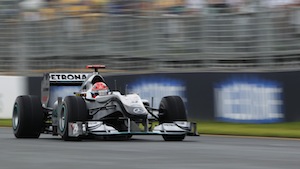
Michael Schumacher at the 2010 Australian Formula One Grand Prix at Albert Park
Melbourne is the undisputed sporting capital of Australia and currently holds the title of ‘Ultimate Sports City’ of the world. But that title is at stake.
Debate has raged over the future of the Australian Grand Prix at Albert Park following Lord Mayor Robert Doyle’s comments that the race has no future beyond its current contract, which expires in 2015.
Judging by the response on talkback radio and in the media, Doyle is getting a lot of support from the Victorian taxpayers who are footing the bill.
Former Victorian premier Jeff Kennett, who initiated Melbourne’s major events push, came out in support of the grand prix, claiming the event was a cornerstone of Melbourne’s calendar and crucial to the city’s international awareness.
Formula One supremo, Bernie Ecclestone, was as forthright as ever in his response, telling radio station 3AW: “If he’s (Doyle) not happy with the event in Australia, if he wants to cancel the contract, we’d be happy to talk to him about that.
If he wishes to cease having the event in Melbourne, I am happy to discuss that with him.”
With annual losses soon to reach $70 million, the question Melburnians are asking is whether it’s worth it.
The problem for grand prix advocates is that so many of the benefits of the event cannot be quantified. While Australian Grand Prix Corporation chairman Ron Walker said the event generates around $180 million in economic benefits for Victoria, a true dollar value cannot be placed on the exposure it generates for Melbourne, with 527 million viewers worldwide watching Formula One.
Also, with so many of these benefits being intangible, the $70 million lose figure tends to grab the headlines and the perception that the grand prix bleeds money has fostered.
So while events such as the one-off World Swimming Championships cost $80 million, according to Kennett, it’s the yearly Australian Grand Prix which has its future constantly questioned.
But the cost debate highlights two keen points. Firstly, Melburnians haven’t connected with the Australian Grand Prix. Unlike the Australian Open tennis, AFL grand final, Boxing Day Test or Melbourne Cup, the Australian Grand Prix isn’t an important part of Melbourne’s cultural makeup.
It was an event born in Adelaide and transplanted onto Melbourne’s sporting calendar, so it’s easy for non-revhead Victorians to wish it away, particularly when it’s served its function in helping to rejuvenate the city, as Kennett argues. Even if it is lost, many would argue there are enough marquee sporting events to retain Melbourne’s standing as a sporting capital.
Secondly, and further to the point I’ve just stated, Melbourne’s (and Australia’s) sporting calendar is becoming so congested with sporting events that there simply isn’t the need for a grand prix.
By my reckoning, February is the only month where there’s no major sporting event in the Victorian capital:
January: Australian Open Tennis.
March: Australian Grand Prix.
March – September: AFL.
October – November: Spring Racing Carnival.
November: Australian Masters Golf (President’s Cup in 2011).
December: Boxing Day Test.
You can also throw in MotoGP and World Superbike rounds at Phillip Island in October and February respectively; four V8 Supercars rounds (including the non-championship round at the Australian Grand Prix); and all the fixtures of their two A-League clubs, Victorian Bushrangers, Melbourne Storm, Rebels, Vixens, Tigers and Aces.
With the rise of Melbourne Victory and Storm and the birth of Melbourne Heart and Rebels, all playing out of AAMI Park – another world-class stadium in the Melbourne’s sporting precinct, which caters so perfectly to the rectangular ground football codes – and the AFL season expanding with growing crowds, Melbourne’s domestic sporting calendar is thriving.
With the addition of a Super Rugby franchise, every code is represented in the Victorian capital, multiplying the viewing options for sports fans.
Two Saturday nights ago Melbourne hosted the A-League’s Melbourne derby at Etihad, KFC Big Bash at the MCG and the Australian Open tennis at Melbourne Park – all well attended and within walking distance from the CBD.
With so much domestic sport on, catering to such varied tastes, its little wonder the future of international sporting events, which cost so many millions, are being questioned.
Why continue to spend $70 million per year when a one-off visit from Oprah can have a greater impact on Australian tourism?
Why spend so much of taxpayers’ dollars on an international event when we have so many domestic sporting events? They are, after all, professionally run, well-attended and held in world-class facilities.
More importantly, they are Australia’s own.
The resistance to Australia’s football World Cup bid due to the disruption to our domestic codes and the enormous cost of the event also highlighted this change in attitude. Post-Sydney 2000, perhaps Australia just doesn’t need and/or want international sporting events anymore.
Australia’s international sporting reputation will be hurt by the loss of the Australian Grand Prix, and Melbourne can kiss goodbye its world sporting capital title, but perhaps it’s a testament to the growth of our homegrown sports. We have it so good here that we’ve become spoilt.
Follow Adrian on twitter @AdrianMusolino





























































































